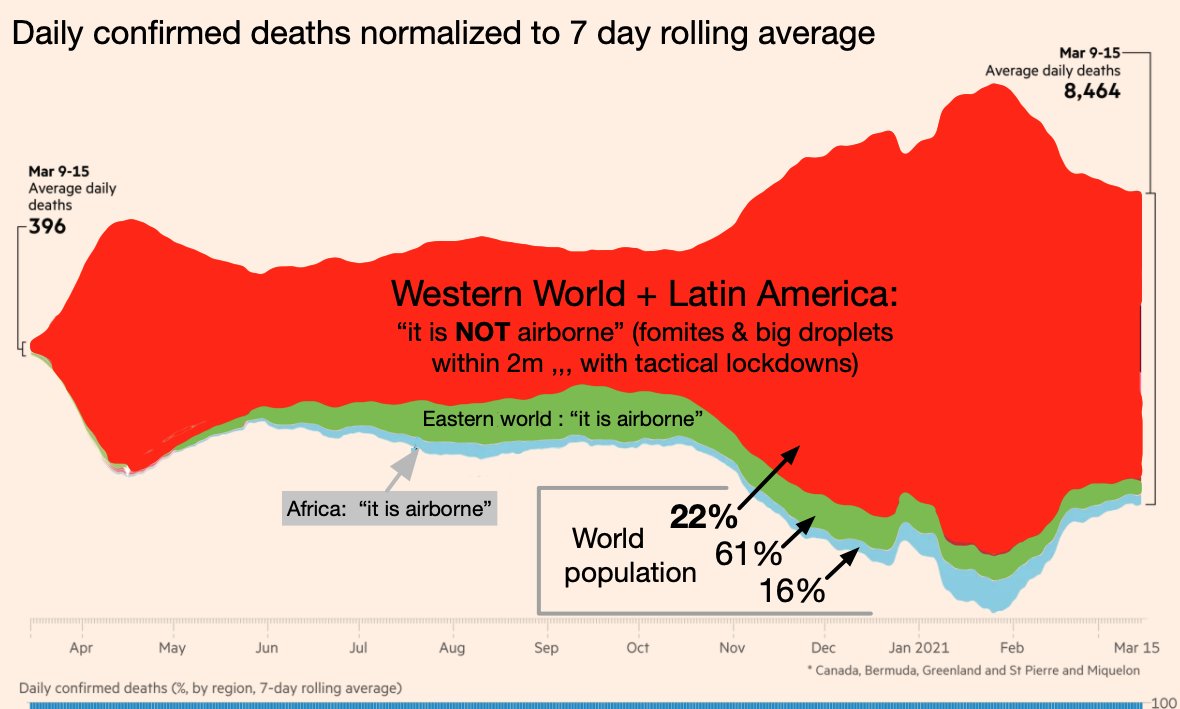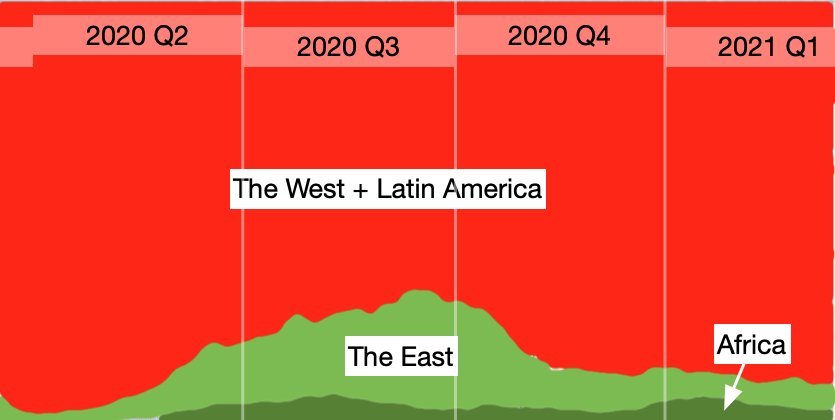March 2020 Reality Tree
We made a “Reality Tree” for the start of the pandemic for Western responses. For the sake of clarification, we have rolled Latin America into “the west”. The classic eastern group of countries are omitted. As are African countries. It is also backdated 12+ months to March 2020. It concerns the western responses to the pandemic as of that time. These countries were mostly aiming to “flatten the curve”. It is far from final - the more people inputting in these things, the better.
The resulting diagram is big and best viewed on a laptop or desktop. Click/tap to zoom in:
Links in the diagram
- tinyurl.com/1ly0wwk2 - COVID-19 has six times the deaths of flu
- tinyurl.com/8tv3gxlk - COVID-19 has 50-100 times the deaths of flu
- its-airborne.org/1 - Covid-19 is airborne - timeline on this site
- its-airborne.org/2 - Many other diseases are airborne - timeline on this site
- https://www.salon.com/2011/02/28/biases - Media generally biasing towards national policy/strategy. There was a study of these biases using one particular wikileaks dump that compared France (LaMonde), UK (TheGuardian), USA (New York Times), and others towards the same biases conclusion.
Background for Reality Trees
So from the “Theory of Constraints”, there’s an industry tool called Current Reality Tree (CRT). Eliyahu Goldratt (Israeli business management guru) devised this “focusing procedure”. Eli co-authored one of the all-time best-selling business books, The Goal, in 1984.
If you’re interested in the science of this, Chris Hohmann goes into the creation of a CRT from scratch for a biz problem in this 17 min video.
Ordinarily a team would use a CRT to identify one or more root causes of a problem. As a group, they would identify something to try to improve a situation. After experimenting with something for a while, the team would try to determine whether the experiment improved the situation, or made it worse or had no effect. From their they’d work out what to do next.
Thoughts about this diagram
Is what we have done for the pandemic useful? Probably not. Some academics, medical folks, and industry/biz people should get in a (zoom) room and start over. They should be careful to not have people in the room who made it worse for that prior period and who have not yet done their decent mea culpa.
What we could work out is the west made a mistake on masks at the start. Even medical science: Google search: ‘David Powell forget masks february 2020’ and Google search: ‘Dr Shunmay Yeung masks don’t work bbc march 2020’ (David Powell would later flip to pro-masks).
Each country should have got all its citizens in cloth masks in March 2020 and kept that going for eighteen months. Each country should also have asked in-country garment and PPE makers to pivot to high-spec cloth masks (and disposable respirators) ASAP and offered R&D grants for that. Grants would happen for vaccine testing and production ramp up, but not for masks or ventilation efforts.
Each country should have gone as far as possible towards “no exemptions” for that. The Airline industry might have been able to save itself, if they had been pro #masks4All on flights from the very start. There’s a chance that if everyone was in masks from the outset, with a following effort to replace bad cloth masks with better cloth masks (and respirators) that the quarantine-hotels could have been avoided. In lieu of that “quarantine at home” with checks on that could have been effective. Without decent #masks4All policies and decent quarantine, the cases would got through the roof and test & trace would become pointless. Lockdown was the only way to claw that back, as Australian proved in July or so (their winter).
Hospitality and face-to-face business could have saved itself, too, with masks and more: Unlike 1918, the west was against ventilation changes for the longest time - this included classrooms outside. Maybe large 30-person canvas tents were not available in 2020 whereas they were in 1918. Canvas tents had large 2-inch (5 cm) wooden poles and could be as high up as 8 feet (2.5m) inside. They could stay up for months at a time and stand up to rough treatment. Modern lightweight tents with aluminuium poles cannot - and are never high enough inside. Pubs, bars and restaurants without the ability to set up outside might have been out of luck if “wave one” started after other mitigations. If all other measures worked and wave one was avoided, then bars are restaurants might have found a way to continue (as they have been in New Zealand and belatedly Australia).
Vietnam and Taiwan were what the west should have been taking know-how from. Snapshot from Financial Times graph tool

Not just those two countries, but they are stand out. New Zealand aced it from the outset (Zero-COVID strategy), but killed international air travel as they implemented quarantine hotels. Australia gets a prize too for getting from exponential growth to Zero-COVID mid-year through hard work (while some arguments raged between national and state governments). Attempts to compare your-badly-performing-country to Sweden was the work of trolls a that’s a false dichotomy; compare to Taiwan (and others) instead. Even China got to per capita ZeroCOVID by the summer of 2020, and didn’t lose it.
Recapping; Using CRT techniques, and resetting the clock back to March 2020, the choices a western countries had were:
- ZeroCOVID strategy: close borders as much as possible, mandatory quarantine in approved venues, masks for all until ZeroCOVID achieved, masks for all every time an outbreak happens (and close some venues) and activate test and trace, some social distancing. Note that multi-layer cloth masks would have been OK and all means all.
- Variation on ZeroCOVID: As above but issue FFP2/N95 made in your country, less social distancing need. All means all.
- Flatten the curve as much as possible: slow down entry into the country but don’t close borders, masks for all (with exemptions), have recommendations on the grade of masks used, ask in-country garment makers to launch washable nano-fiber masks (pay grants up front), allow quarantine for incoming international travelers at their own volition but police it, test and trace running constantly, intermittent and incremental use of lockdowns when exponential growth happening, indemnify business and others on infection/deaths. Accept higher resulting death count (immoral in our opinion) and damaged economy.
- Flatten the curve as little as possible: As #3, but don’t say much about grades of masks, maybe don’t communicate the airborne nature of transmission, don’t check on self-quarantining travelers, choose late moments to implement lockdown, open up again perhaps too early, pretend some settings don’t carry transmission risk, accept higher-still resulting death count (immoral in our opinion) and savaged economy.
Aiming at Zero-COVID was the cost effective move. More countries will choose to go to that status (with transition costs). As well as east/west and developing/developed bifurcated worlds, we could well also have COVID/zero-COVID worlds. That would come with quarantines between them and QR-code or blockchain (Hedera) verifiable vaccine records for travellers already inside the zero-COVID world. Some countries would transition in 2021, some in 2022. Some perhaps never. Some may elect to leave Zero-COVID world to join COVID world - if they think the reduced deaths/Long-COVID after vaccines is worth it versus not quarantining incoming travelers with no proof of vaccination. Quick and good treatments that keep everyone aloive and well might persuade countries to go that way.
Need more convincing that the west did it wrong?
Here’s some more Financial Time graphics we pasted into a paint page and simplified with “flood fill” to make west vs east again:
This is what happened when “it is NOT airborne” guided the game plan: A disproportionally bad western world response. Extra info for world population (with rounding errors). It is not clear where Australia and New Zealand are:
Same information, but normalized to 100%:

